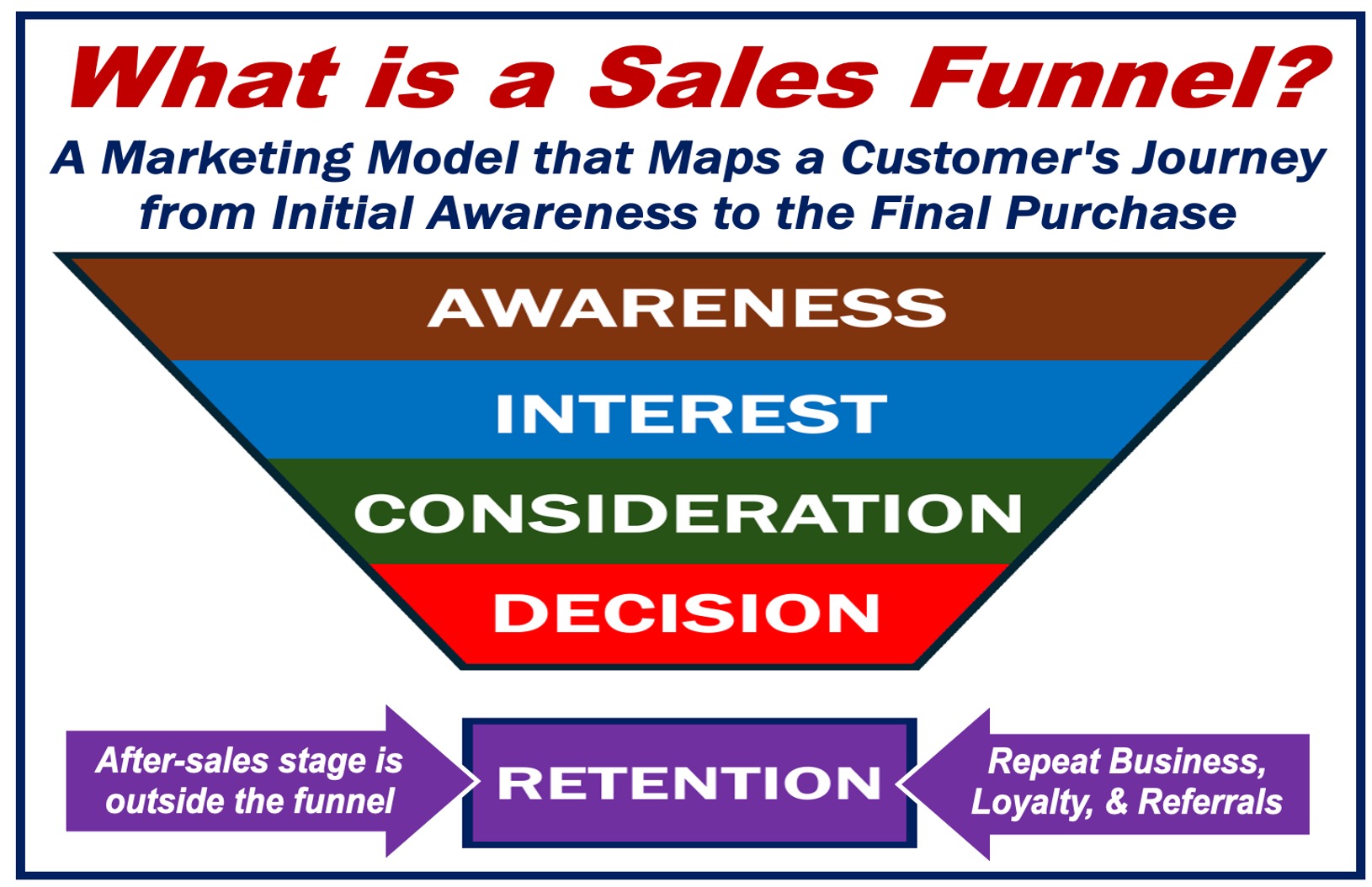A Sales Funnel describes the path that a paying customer took from being a sales lead or prospect to purchasing the product or service. It is a marketing term for the journey that prospects go through on the way to purchase.
A prospect is somebody who you believe has a good chance of becoming a paying customer – in other words, a prospective customer.
The terms Customer Funnel, Purchase Funnel, or Marketing Funnel have very similar meanings to Sales Funnel.
In the world of business, a sales funnel is a powerful tool. It helps us understand how consumers move from being potential customers to actually buying your product or service. It can also help you improve your conversion rate by identifying possible flaws in the process.
Mailshake.com has the following definition of the term:
“A sales funnel maps the journey a prospective customer goes through when purchasing products or services. Creating a sales funnel helps identify possible holes in the process where prospects are losing interest.”
Picture a funnel
Imagine a real funnel, wide at the top and narrow at the bottom. The sales funnel works in a similar way. At the top, the entrance, you have a large pool of people who might be interested in your product.
As we move through the funnel, some people lose interest and drop out. The ones who continue right through to the other end are those who become paying customers.

The stages
There are various ways to break down a sales funnel. Below, you can see the most common stages:
-
Awareness
This is where people first learn about your business, product, or service. Salespeople may refer to them as leads or cold leads.
-
Interest
They become curious and want to know more. They are now warm leads. Some people may refer to them as prospects.
-
Consideration
They start to think seriously about whether your offering is right for them.
-
Decision
They decide whether to make the purchase. At this point, the prospect or warm lead either becomes a paying customer or drops out.
Technically, this one is outside the sales funnel, but many people include it as one of the stages. After the purchase, your focus shifts to keeping customers engaged and satisfied with their new product. You also try to encourage repeat business, cultivate loyalty, and generate referrals.
Benefits of a sales funnel
Sales funnels are good for business. Let’s take a look at some of the benefits they can offer:
-
Understanding your customers
The funnel can help you visualize the steps that your prospects take on their buying journey.
-
Targeting your marketing
In other words, knowing what to say and when to say it. Once you know where your prospects are in the funnel, you can tailor your messages and offers to be most effective.
-
Improving conversion rates
By identifying where most people drop out in the funnel, you can find ways to encourage them to continue moving forward until they become happy customers.
-
Maximizing efficiency
By streamlining the sales process, a sales funnel can help you allocate resources more effectively, ensuring that you invest your time and effort in leads most likely to convert into sales.
-
Enhancing customer experience
A well-structured funnel streamlines the customer journey, enhancing clarity and confidence, ultimately leading to greater satisfaction.
Example of a sales funnel
Imagine you sell handmade jewelry online. Here’s how a sales funnel might work for you:
-
Awareness
2,000 people become aware of your jewelry through social media ads or a blog post.
-
Interest
70 of them visit your website and browse your collections.
-
Consideration
40 prospects read product descriptions, compare prices, and maybe add something to their shopping cart.
-
Decision
5 people complete the purchase and become paying customers.
-
Retention
After the purchase, you engage customers with follow-up emails, exclusive offers, and requests for feedback to encourage repeat business and cultivate brand loyalty.
Building Your Sales Funnel
Creating and managing a sales funnel takes effort and strategy. You’ll need to use a variety of marketing tactics to attract people to the top of the funnel and then guide them along their journey until they become satisfied and ultimately loyal customers.
The world’s most successful companies staunchly advocate using sales funnels, recognizing them as fundamental to their sustained growth and customer retention.
If they are critical tools for global leaders, isn’t it time you consider integrating them into your business strategy for a competitive edge?
